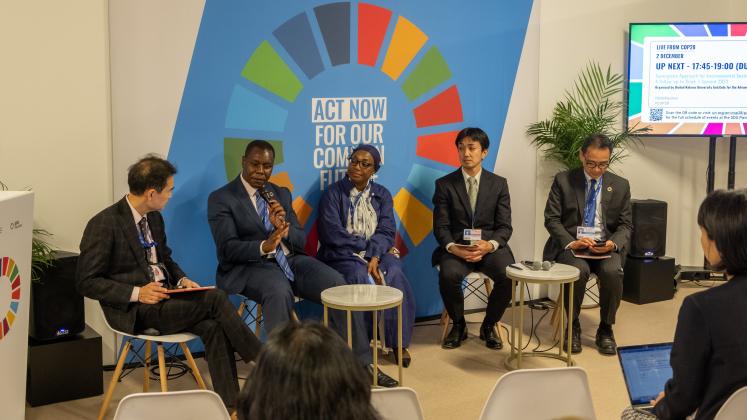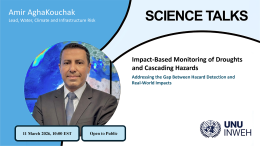On 2 December 2023, a UNU-IAS side event at the UN Climate Change Conference (COP28) in Dubai explored how synergistic action on climate and sustainable development can support just transition, with a focus on energy and food systems. The event built on the outcomes of the Think7 Japan Summit (April 2023) to identify approaches for enhancing policy coherence in these areas and beyond. Held at the SDG Pavilion, it brought together speakers from governments, UN organizations, civil society and think tanks.
Opening remarks by Edeltraud Guenther (Director, UNU-FLORES) emphasized that synergetic solutions were needed to address the key challenges under discussion at COP28, such as pathways to meet climate goals, clean energy and climate finance. H.E. Dr. Alue Dohong (Vice Minister of Environment and Forestry, Indonesia) outlined the climate commitments of Indonesia, underlining that the transition to zero carbon would require integrated action across sectors, exchanging knowledge and resources.
Akio Takemoto (Head of Programme & Administration, UNU-IAS) summarized the outcomes of the Think7 Japan Summit. Among the key challenges identified was the social transformation entailed by rapid energy transition, which could increase vulnerabilities and entrench inequalities. He highlighted the growing demand for critical minerals as an example of the tradeoff between action on climate and the SDGs.
A panel discussion moderated by Dr. Takemoto shared insights and perspectives from Africa, Asia and Europe, highlighting the interlinked social dimensions of the sustainability transition in multiple sectors. Fatima Denton (Director, UNU-INRA) examined the impacts of a rapid energy transition and what they would mean for Africa, focusing on the problem of stranded assets. Outlining efforts by Japan International Cooperation Agency (JICA) to advance synergies, Kohji Mitomori (Director, Office for Sustainability Management [Climate Change, Nature], JICA) underlined the need to pursue climate-resilient development and look beyond the SDGs.
Philip Osano (Centre Director, Stockholm Environment Institute Africa; Chair, UNU-IAS Board) discussed the synergies needed in agriculture, focusing on Africa. He noted that addressing food waste required significant investment in technology, and would increase energy use. Considering sustainable food policies in the EU, Eric Ponthieu (Strategy Director, Fair Trade Advocacy Office) examined how the food transition and energy transition were interlinked and overlapping. Minoru Takada (Team Leader [Energy], UN DESA) outlined the progress made on climate–SDG synergies in global policymaking, including the Third Global Conference on Climate and SDG Synergies that was held at UNU in 2022. He called for more research to generate evidence on the benefits of integrated action, and emphasized the need for justice and equity in pursuing synergies.





